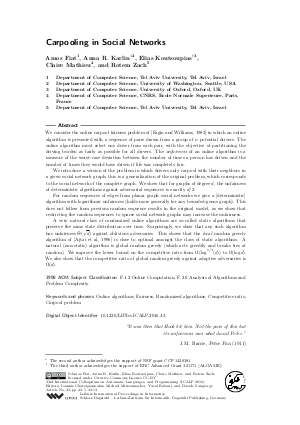Carpooling in Social Networks
Authors Amos Fiat, Anna R. Karlin, Elias Koutsoupias, Claire Mathieu, Rotem Zach
-
Part of:
Volume:
43rd International Colloquium on Automata, Languages, and Programming (ICALP 2016)
Part of: Series: Leibniz International Proceedings in Informatics (LIPIcs)
Part of: Conference: International Colloquium on Automata, Languages, and Programming (ICALP) - License:
 Creative Commons Attribution 3.0 Unported license
Creative Commons Attribution 3.0 Unported license
- Publication Date: 2016-08-23
File

PDF
LIPIcs.ICALP.2016.43.pdf
- Filesize: 0.51 MB
- 13 pages
Document Identifiers
Subject Classification
Keywords
- Online algorithms
- Fairness
- Randomized algorithms
- Competitive ratio
- Carpool problem
Metrics
- Access Statistics
-
Total Accesses (updated on a weekly basis)
0PDF Downloads0Metadata Views
Abstract
We consider the online carpool fairness problem of [Fagin and Williams, 1983] in which an online algorithm is presented with a sequence of pairs drawn from a group of n potential drivers. The online algorithm must select one driver from each pair, with the objective of partitioning the driving burden as fairly as possible for all drivers. The unfairness of an online algorithm is a measure of the worst-case deviation between the number of times a person has driven and the number of times they would have driven if life was completely fair.
We introduce a version of the problem in which drivers only carpool with their neighbors in a given social network graph; this is a generalization of the original problem, which corresponds to the social network of the complete graph. We show that for graphs of degree d, the unfairness of deterministic algorithms against adversarial sequences is exactly d/2. For random sequences of edges from planar graph social networks we give a [deterministic] algorithm with logarithmic unfairness (holds more generally for any bounded-genus graph). This does not follow from previous random sequence results in the original model, as we show that restricting the random sequences to sparse social network graphs may increase the unfairness.
A very natural class of randomized online algorithms are so-called static algorithms that preserve the same state distribution over time. Surprisingly, we show that any such algorithm has unfairness ~Theta(sqrt(d)) against oblivious adversaries. This shows that the local random greedy algorithm of [Ajtai et al, 1996] is close to optimal amongst the class of static algorithms. A natural (non-static) algorithm is global random greedy (which acts greedily and breaks ties at random). We improve the lower bound on the competitive ratio from Omega(log^{1/3}(d)) to Omega(log(d)). We also show that the competitive ratio of global random greedy against adaptive adversaries is Omega(d).
Cite As Get BibTex
Amos Fiat, Anna R. Karlin, Elias Koutsoupias, Claire Mathieu, and Rotem Zach. Carpooling in Social Networks. In 43rd International Colloquium on Automata, Languages, and Programming (ICALP 2016). Leibniz International Proceedings in Informatics (LIPIcs), Volume 55, pp. 43:1-43:13, Schloss Dagstuhl – Leibniz-Zentrum für Informatik (2016)
https://doi.org/10.4230/LIPIcs.ICALP.2016.43
BibTex
@InProceedings{fiat_et_al:LIPIcs.ICALP.2016.43,
author = {Fiat, Amos and Karlin, Anna R. and Koutsoupias, Elias and Mathieu, Claire and Zach, Rotem},
title = {{Carpooling in Social Networks}},
booktitle = {43rd International Colloquium on Automata, Languages, and Programming (ICALP 2016)},
pages = {43:1--43:13},
series = {Leibniz International Proceedings in Informatics (LIPIcs)},
ISBN = {978-3-95977-013-2},
ISSN = {1868-8969},
year = {2016},
volume = {55},
editor = {Chatzigiannakis, Ioannis and Mitzenmacher, Michael and Rabani, Yuval and Sangiorgi, Davide},
publisher = {Schloss Dagstuhl -- Leibniz-Zentrum f{\"u}r Informatik},
address = {Dagstuhl, Germany},
URL = {https://drops.dagstuhl.de/entities/document/10.4230/LIPIcs.ICALP.2016.43},
URN = {urn:nbn:de:0030-drops-63234},
doi = {10.4230/LIPIcs.ICALP.2016.43},
annote = {Keywords: Online algorithms, Fairness, Randomized algorithms, Competitive ratio, Carpool problem}
}
Author Details
References
-
Miklos Ajtai, James Aspnes, Moni Naor, Yuval Rabani, Leonard J Schulman, and Orli Waarts. Fairness in scheduling. Journal of Algorithms, 29(2):306-357, 1998.

- Amihood Amir, Oren Kapah, Tsvi Kopelowitz, Moni Naor, and Ely Porat. The family holiday gathering problem or fair and periodic scheduling of independent sets. CoRR, abs/1408.2279, 2014. URL: http://arxiv.org/abs/1408.2279.
-
Joao Pedro Boavida, Vikram Kamat, Darshana Nakum, Ryan Nong, Chai Wah Wu, and Xinyi Zhang. Algorithms for the carpool problem. IMA Preprint Series, pages 2133-6, 2006.

- Don Coppersmith, Tomasz Nowicki, Giuseppe Paleologo, Charles Tresser, and Chai Wah Wu. The optimality of the online greedy algorithm in carpool and chairman assignment problems. ACM Trans. Algorithms, 7(3):37:1-37:22, July 2011. URL: http://dx.doi.org/10.1145/1978782.1978792.
-
Ronald Fagin and John H Williams. A fair carpool scheduling algorithm. IBM Journal of Research and development, 27(2):133-139, 1983.

-
Ernst Fehr and Klaus M Schmidt. A theory of fairness, competition, and cooperation. Quarterly journal of Economics, pages 817-868, 1999.

-
L. Festinger. A Theory of Cognitive Dissonance. Mass communication series. Stanford University Press, 1962.

- George F. Loewenstein, Leigh L. Thompson, and Max H. Bazerman. Social utility and decision making in interpersonal contexts. Journal of Personality and Social Psychology, 57(3):426-441, 1989. URL: http://dx.doi.org/10.1037/0022-3514.57.3.426.
- Moni Naor. On fairness in the carpool problem. Journal of Algorithms, 55(1):93 - 98, 2005. URL: http://dx.doi.org/10.1016/j.jalgor.2004.05.001.
- R. Tijdeman. The chairman assignment problem. Discrete Mathematics, 32(3):323 - 330, 1980. URL: http://dx.doi.org/10.1016/0012-365X(80)90269-1.
- Zach and Fiat. Lower bounds for carpooling, 2015. URL: https://www.cs.tau.ac.il/~fiat/rotem_msc_thesis.pdf.
